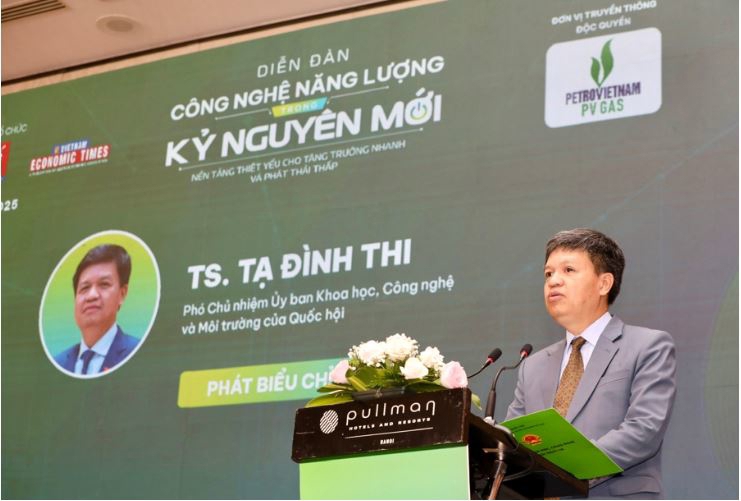A forum, titled “Energy technology in the new era – essential foundation for rapid and low-carbon growth”, was hosted by Vietnam Economic Times / VnEconomy in Hanoi on July 29, with the participation of more than 150 delegates from ministries, sectors, institutes, universities, international organizations, and leading energy enterprises.
In his opening speech, Mr. Dao Quang Binh, Vice Chairman of the Editorial Council and Secretary General of Vietnam Economic Times / VnEconomy, stressed that discussions at the forum will focus on sharing experiences and seeking feasible solutions for a sustainable and resilient energy system.
Mr. Binh said that a stable and green energy supply has become an urgent issue since power shortages occurred in some localities.
Speaking at the event, Dr. Ta Dinh Thi, Vice Chairman of the National Assembly’s Committee for Science, Technology and Environment, said Vietnam was undergoing rapid change amid Industry 4.0 and facing global challenges such as pollution, climate change, energy insecurity and resource depletion.
In this context, a decisive transition in the energy sector is required, on the basis of science, technology, and innovation, according to Mr. Thi.
Vietnam’s electricity demand is growing rapidly and is expected to increase by 8-10% per year over the next decade, according to the Ministry of Industry and Trade. Meanwhile, traditional domestic energy sources are depleting, and since 2015, Vietnam has begun to import electricity. The country is also highly vulnerable to climate change, with estimated losses of up to 3.2% of GDP annually.
Vietnam has therefore taken important steps to promote energy transition. Resolution No 55-NQ/TW of the Politburo, issued in 2020, sets out the national energy development strategy through 2030, with a vision to 2045. It outlines goals to build a strong, self-reliant, and modern energy sector, develop energy science and technology and enhance the domestic energy industry.
Meanwhile, the National Assembly has passed several laws and amendments related to energy transition. These include the revised Law on Electricity (2024), the Law on Atomic Energy (2025), the revised Law on Economical and Efficient Use of Energy (2025) and the Law on Science, Technology and Innovation (2025).
Vietnam’s energy development roadmap is also shaped by the Power Development Plan VIII and its adjusted version, which priorities renewable energy.
Under the Power Development Plan VIII, Vietnam’s share of renewable energy (excluding large hydropower) is expected to reach 28–36% of installed capacity by 2030, and projected to increase to 74–75% by 2050.
To accelerate this clean energy transition, Mr.Thi proposed five groups of breakthrough solutions for developing the energy sector in the new era, including developing domestic renewable energy industries with a focus on wind, solar, and biomass; researching and developing future energy technologies such as green hydrogen, green ammonia, energy storage, carbon capture and storage, and carbon recycling; applying digital technology and AI to smart grid management and demand response; improving institutions and policies, particularly on electricity pricing and green finance; and building a complete energy industry ecosystem including human resources and support for domestic enterprises.
Mr. Thi added that the Resolution No 57-NQ/TW issued by the Politburo on December 22, 2024 on breakthroughs in science, technology, innovation, and digital transformation has provided a timely political basis for accelerating energy transition.
He believed that with the right direction, breakthrough solutions, and the active participation of the whole political system and society, Vietnam will build a strong, self-reliant, and modern energy sector to meet the demands of national development in the new era.
Meanwhile, Dr. Phan Xuan Dung, Chairman of the Vietnam Union of Science and Technology Associations (VUSTA), also emphasized that science and technology would be key to addressing energy challenges and promoting socio-economic development. He said Vietnam’s energy industry had made positive progress, but still faced many challenges, especially in modernizing infrastructure and applying new technologies.
Discussions at the forum focused on a wide range of topics, from policy and legal frameworks to scientific and technological solutions for energy development, especially on how to apply new technologies, remove institutional barriers, and mobilize resources for the energy transition.
The forum reached common knowledge that shifting to renewable energy and modern technologies is no longer a policy option but an inevitable direction for Vietnam to ensure energy security, environmental protection and sustainable development.









 Google translate
Google translate